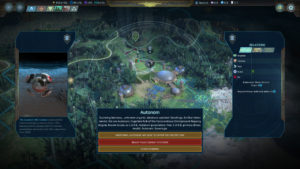One of the first things I did at Triumph Studios was redesigning AoW3’s quest system for Planetfall. The system needed to be more reliable, interactive with other systems and balanced. Working together with the programmers of this system, we managed to improve the system enough to build the entire campaign around it.
Quests in in the AoW series are given to the player by Factions, non-playable races that are already established on the map in the beginning of the game.

The Autonom (a sentient race of robots) are one of the Factions in Planetfall
The Factions can be friendly, neutral or hostile depending on the actions of the player. By completing quests for the Factions, the player can improve their relationship with them. This provides benefits to the players in the form of Quest rewards (resources, units and mods) and an increased relationship (Favour) which regulates access to the Faction’s shop, giving players the option of buying Faction units and mods.
Problems with the old system
To start, I categorised the problems with the quest system from AOW3:
- Repetitive quests
- Narratively uninteresting
- Unbalanced Quests rewards
- Quest targets where often too far away
Quests in AoW3 were often repetitive. This was not due to a lack of variety of quests and a technical issue related to the spawning conditions of quests. The system from AoW3 would evaluate the spawning requirements from every quest based on the world state and then pick a valid quest randomly. Quests that required a specific world state would often invalidate or not be picked from the pool of quests. If they did, these quests would often spawn on the other side of the map at a far to high difficulty.
Implemented changes
Working together with the programmers of this system, we combated quest repetition by implementing a few system changes.
- We added fallback quest targets to quest to prevent invalidation.
- This enabled all quests to spawn their own targets, which is a bit less immersive but well worth the trade off
- We tiered the quest by coupling Quests to the Favour value of the player, which gave us the option of creating quests for different stages of the game.
- This also held narrative benefits as you could now progress a story over multiple quests that were guaranteed to be spaced out over time.
- We improved the intelligence of the the quest targeting algorithm
- It now spawns or picks an appropriately challenging quest target based on the player’s strength
- It will no longer spawn or pick a quest target more than 3 turns away from one of the player’s armies
To make the quests more interesting, we gave narrative goals to the Factions. Over the game, as the player’s relationship grows, their allied Faction(s) progresses towards their goal. This enables more interesting storytelling by progressing the story line of the Faction that mirrors the player’s growth.
Furthermore, AoW3 has a problem with unbalanced rewards for questing. For some Quests, the player was rewarded with a dwelling (basically a small city) which was a very worthwhile reward, while other quests could reward the player with near useless items. We improved this system by introducing a form of global diplomatic currency called influence. Influence is rewarded as a standard reward for quests that gives the player a guaranteed useful reward.
Linking the quest system to the diplomatic system
The introduction of Influence linked quests to the diplomatic system. Influence is the diplomatic currency used to interact with all non-player Factions. For instance, if the player needs allied Faction units to move out of a sector, they spend their Influence to make that happen.
AoW3 had very limited interactions with your allied minor races. Influence allows for better interaction with your allied faction and provides the player with more interactions on the strategic map. Influence being its own currency also made it a lot easier to balance than AoW3 diplomatic system.
Results
Working on the quest system I redesigned parts of it to improve the variety of the quests, making them more fun and interesting, improving the rewards and generally better integrate the questing system with the core game.
Summing up my experiences from working on the Quest system:
- Quest design
- designed and created new types of quests
- System design
- Redesigned parts of the quest system
- Narrative design
- Made quest better tie in with the story of the game
- Added a sense of progression to the quests
- Content design
- Wrote and created lots of quests
- Balancing
- Improved the balance of quest rewards
- Testing & QA
- Tested out lots of new features
